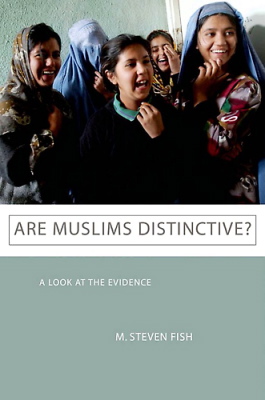
In his new book Are Muslims Distinctive? (Oxford University Press), Fish examines a wealth of individual-level data (mostly from the World Values Surveys) and country-level data, comparing Muslims to other believers and non-believers on personal religiosity, social capital and tolerance, corruption and crime, terrorism, social inequality and democracy. Fish writes that country-level data poses the problem of controlling for factors that may be responsible for the results other than Islamic beliefs and identity, but in some cases those are the only available kinds of data.
Muslims rate the importance of God in their lives more highly than non-Muslims. The differences between Muslims and Christians, however, were not significant. Muslims are not particularly more supportive of the idea that religious leaders should influence people’s political behavior, although they are unusual in their opposition to atheists holding public office. On a sociability index created by Fish, which measures the level of intra-group loyalty and activity (such as joining religious organizations), Muslims were found not to be significantly more sociable than Christians.
Intolerance levels were also not necessarily higher for Muslims than non-Muslims, although there was less acceptance of abortion and divorce and particular opposition toward homosexuality. There was some influence of national contexts in these results; for instance, living in a country with a significant Christian population increases a Muslim’s tolerance for divorce (although far less for homosexuality). As for crime and corruption, in controlling for political and socioeconomic factors, Fish finds that Muslims are not unusually prone to corruption, and that at least on a national level, Muslim countries are low on the “anomie” that leads to high murder rates (a 2.1 percent murder rate in Muslim nations compared to an 11 percent rate in non-Muslim countries).
Fish also found that in places where Muslims predominate, “females tend to fare relatively poorly” in terms of political equality. But Fish notes that the status of women in public life and the gap between male and female incomes were most clearly correlated with the Islamic factor. On support for democracy, there was little significant difference between Muslims and Christians in their views of this form of government. Yet Muslim countries do have lower scores on political openness than non-Muslim countries.
The chapter on political violence and terrorism is the longest and most likely to be contested by critics. Fish makes a distinction between political violence and terrorism. The former is defined by national conflicts, such as civil wars, large scale government repression, and inter-ethnic battles. The author finds no evidence that Muslim nations are more susceptible to these kinds of political violence than other countries; in Muslim countries, on average, 0.65 percent of the population died in major political violence, while in non-Muslim countries, the figure was 0.72 percent.
Fish writes that most acts of terrorism are committed in Muslim countries and are geographically concentrated in seven countries. But he also found that self-proclaimed Islamists have been responsible for three-fifths of all such incidents and nearly seven-tenths of all terrorist-related deaths.
Fish concludes that his study’s findings can have practical consequences. For instance, the finding that Muslims are not more prone to mass political violence could suggest to policy makers that the blame for predominantly Muslim countries undergoing large-scale violence (such as Sudan or Iraq) cannot be attributed to the “inhabitants’ religion per se…”
Richard Cimino
The World Values Survey can be accessed online at: http://www.worldvaluessurvey.org.